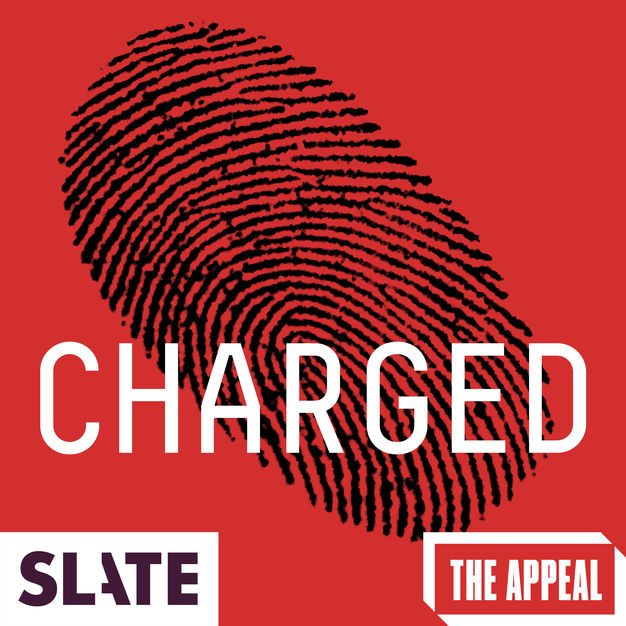
Charged | A True Punishment Story
For two and a half years, Emily Bazelon has been followed people through a special court in New York designed to be a speedy machine for the harsh punishment of illegal gun possession. Along the way, a strange thing happened—the politics outside the courtroom started to change when a new generation of activists and insiders began challenging the old system the gun court was part of. Charged | A True Punishment Story brings you a fight to transform one big-city justice system.
- 59 minutes 25 secondsAmicus | Trump’s American Takeover
If you’re punch-drunk and disoriented this week, come on in. Donald J Trump’s second administration is materializing at frightening speed and recklessness and it is hard (and stressful) to keep up with it all. Kim Lane Scheppele, the Laurance S. Rockefeller Professor of Sociology and International affairs at Princeton University, explains that the speed and viciousness of the legal orders in Trump 2.0 are evidence that America switched over to the fast track for autocracy on January 20th, 2025. An expert in the law of autocracy, Scheppele has seen firsthand what happened to constitutional courts and the democratic norms that governed them in Russia and Hungary and she joins Dahlia Lithwick on Amicus this week to explain how Trump’s executive orders on everything from government funding to transgender people in the military reveal a familiar global playbook that has chillingly familiar endpoints.
Un-paywalled episodes' description:
Want more Amicus? Join Slate Plus to unlock weekly bonus episodes with exclusive legal analysis. Plus, you’ll access ad-free listening across all your favorite Slate podcasts. You can subscribe directly from the Amicus show page on Apple Podcasts and Spotify. Or, visit slate.com/amicusplus to get access wherever you listen.
Learn more about your ad choices. Visit megaphone.fm/adchoices
1 February 2025, 8:00 am - 42 minutes 52 secondsAmicus | Extra: The Federal Funding Freeze
Amicus is coming to you with an extra episode because of the five-alarm threat to the balance of power in the wake of Monday and Tuesday’s memos from the White House Office of Management and Budget freezing vast tranches of federal funding. As agencies, states, and nonprofits scramble to figure out if they can make payroll or even keep the lights on, a hugely significant legal battle is brewing over what, if any, actual restraint remains on this administration’s vision of presidential power. Dahlia Lithwick is joined by Professor Stephen Vladeck of Georgetown University Law Center to understand the ramifications of a flimsy memo that threatens the very structure of government as we know it in the United States.
The Impoundment Crisis of 2025 - by Steve Vladeck
Want more Amicus? Join Slate Plus to unlock weekly bonus episodes with exclusive legal analysis. Plus, you’ll access ad-free listening across all your favorite Slate podcasts. You can subscribe directly from the Amicus show page on Apple Podcasts and Spotify. Or, visit slate.com/amicusplus to get access wherever you listen.
Learn more about your ad choices. Visit megaphone.fm/adchoices
28 January 2025, 9:10 pm - 30 minutes 44 secondsWhat Next | Trump’s Gift to Militias
Between Trump’s broad pardon for January 6 rioters and Facebook loosening restrictions on its platforms, it’s looking much easier for militia groups like the Oathkeepers and Proud Boys to recruit members, organize, and carry out violence.
Guest: Josh Kaplan, reporter for ProPublica.
Want more What Next? Join Slate Plus to unlock full, ad-free access to What Next and all your other favorite Slate podcasts. You can subscribe directly from the What Next show page on Apple Podcasts and Spotify. Or, visit slate.com/whatnextplus to get access wherever you listen.
Podcast production by Elena Schwartz, Paige Osburn, Anna Phillips, Madeline Ducharme and Rob Gunther.
Learn more about your ad choices. Visit megaphone.fm/adchoices
27 January 2025, 8:00 am - 1 hour 5 minutesAmicus | Trump’s Unconstitutional Rampage Against Immigration
It’s barely been a week and the torrent of horrible coming from the pens and mouth of President Trump is staggering. Many of the executive orders signed this week focus on immigration, and that is where we have our eyes trained as well. This week, to help us make sense of the whirlwind that threatens to upend the lives of millions of people Dahlia Lithwick talks to Aaron Reichlin-Melnick, Senior Fellow and former policy director at the American Immigration Council, a pro-immigrant nonprofit aiming to defend immigrants through litigation, advocacy, and more. Not all executive orders are created equal, and so Aaron leads us through what’s constitutionally possible, legally probable, and already swinging into action from Trump’s immigration edicts.
Aaron’s post about Bishop Mariann Edgar-Bunne: https://bsky.app/profile/reichlinmelnick.bsky.social/post/3lgdojbbjvk2y
Amicus’s October episode on the Alien Enemies Act of 1798 with Katherine Yon Ebright,
Want more Amicus? Join Slate Plus to unlock weekly bonus episodes with exclusive legal analysis. Plus, you’ll access ad-free listening across all your favorite Slate podcasts. You can subscribe directly from the Amicus show page on Apple Podcasts and Spotify. Or, visit slate.com/amicusplus to get access wherever you listen.
Learn more about your ad choices. Visit megaphone.fm/adchoices
25 January 2025, 8:00 am - 12 minutes 34 secondsAmicus | Preview: Deciphering The Lawlessness of Trump’s Executive Orders
Some very clear themes are already emerging from President Donald Trump’s executive orders; cruel, chaotic, and fear-stoking - yes, but also - they’re rife with shoddy drafting (is that you, ChatGPT?), sloppy lawyering, and some are wildly unconstitutional. In an extra episode of Amicus for plus members, Dahlia Lithwick and Mark Joseph Stern begin the work of parsing a few of the many, many executive orders raining down on America in the hours since Trump assumed office for the second time.
This episode is member-exclusive. Listen to it now by subscribing to Slate Plus. By joining, not only will you unlock weekly bonus episodes of Amicus—you’ll also access ad-free listening across all your favorite Slate podcasts. You can subscribe directly from the Amicus show page on Apple Podcasts and Spotify. Or, visit slate.com/amicusplus to get access wherever you listen.
Learn more about your ad choices. Visit megaphone.fm/adchoices
22 January 2025, 9:00 pm - 1 hour 20 minutesCulture Gabfest: Chalamet Goes Electric
On this week’s show, the hosts dive into A Complete Unknown, director James Mangold’s surprisingly charming Bob Dylan biopic that’s all about fame and what it looks like to be adjacent to it. Then, the three explore Dick Wolf’s latest project: On Call, a half-hour cop procedural set in Long Beach, California that’s streaming on Prime Video. Finally, the trio remembers David Lynch, the iconic, singular filmmaker who passed away last week at the age of 78.
In the exclusive Slate Plus segment, the panel goes electric themselves and responds to a listener question from Rob: “Would you reminisce about the most electric experience you’ve had consuming a piece of culture with other people?”
Email us at [email protected].
Endorsements:
Dana: The Soul of the Dance, a one-hour documentary about ballerina Ulyana Lopatkina.
Julia: The Thursday Murder Club by Richard Osman. Alos, Julia is looking for nonfiction recommendations about Japan! Email her at [email protected].
Steve: Two Australia-related endorsements: (1) The Fatal Shore by Robert Hughes. (2) BUSH, a restaurant in Sydney’s Redfern neighborhood.
Podcast production by Vic Whitley-Berry. Production assistance by Kat Hong.
Learn more about your ad choices. Visit megaphone.fm/adchoices
22 January 2025, 8:20 am - 1 hour 1 minuteAmicus | The New Constitutional (dis)Order
Donald Trump becomes president again on Monday, and as Joe Biden leaves the White House, we’re on the brink of a massive change in how the law is interpreted. Pam Bondi’s confirmation hearing was one of a host of clues this week that we are in for a wild legal and constitutional ride. On this episode of Amicus, host Dahlia Lithwick is joined by constitutional scholar Professor Pamela Karlan to pick through what we learned this week about what the law is and what it is about to become –– from Jack Smith’s report, to the new (presumptive) Attorney General of the United States’ apparent ignorance of birthright citizenship and therefore the 14th amendment.
Learn more about your ad choices. Visit megaphone.fm/adchoices
18 January 2025, 8:00 am - 55 minutes 20 secondsSlate Money | The Dire Costs of the LA Fires
This week: Los Angeles continues to try and fight back its most devastating wildfire ever. Felix Salmon, Emily Peck, and Elizabeth Spiers discuss the fires raging in Los Angles and how they highlight the growing problem with disaster insurance as well as the complex issues around prison labor. Then, Meta is walking back their content moderation, giving hate speech more of a chance to thrive on their platforms. The hosts debate what this will mean for advertisers and Meta employees alike. And finally, New York City has at last implemented its congestion pricing. And while it’s too early to know the effects, the hosts look to London to see what the future could hold for the city’s commuters.
In the Slate Plus episode: Wirkin Bag Economics
Want to hear that discussion and hear more Slate Money? Join Slate Plus to unlock weekly bonus episodes. Plus, you’ll access ad-free listening across all your favorite Slate podcasts. You can subscribe directly from the Slate Money show page on Apple Podcasts and Spotify. Or, visit slate.com/moneyplus to get access wherever you listen.
Podcast production by Jessamine Molli and Cheyna Roth.
Learn more about your ad choices. Visit megaphone.fm/adchoices
11 January 2025, 10:00 am - 1 hour 2 minutesAmicus | TikTok Is Cooked, Trump Is Sentenced
While Donald J Trump was virtually fuming at his sentencing hearing in Judge Juan Merchan’s New York City courtroom on Friday morning, the nine justices of the US Supreme Court were taking their seats for oral arguments in the so-called TikTok ban case. And while it only took 40 minutes for the president elect’s sentence of an ‘unconditional discharge’ to be pronounced, the arguments over national security, the First Amendment, and an app that 170 million Americans use took a couple of hours longer.
Amicus has an analysis of all of it. First, Dahlia Lithwick and Mark Joseph Stern discuss whether and how Trump’s sentence matters, and what it tells us about the Supreme Court under Trump 2.0. Next, they’re joined by Gautam Hans, clinical Professor of Law at Cornell Law School, who specializes in constitutional law, technology law and policy, to discuss why the Supreme Court seemed so very ready to reach right past the First Amendment and grab for national security in order to uphold the TikTok ban.
Want more Amicus? Join Slate Plus to unlock weekly bonus episodes with exclusive legal analysis. Plus, you’ll access ad-free listening across all your favorite Slate podcasts. You can subscribe directly from the Amicus show page on Apple Podcasts and Spotify. Or, visit slate.com/amicusplus to get access wherever you listen.
Learn more about your ad choices. Visit megaphone.fm/adchoices
11 January 2025, 8:00 am - 6 minutes 16 secondsAmicus | Preview: Trump’s Racking Up Supreme Court Loyalty Points
How do you eat an elephant? One bite at a time.* There is a cluster-you-know-what of constitutional and legal news this week, so Amicus Plus is popping up a little early with a bonus episode to tackle the Trump prosecutions portion of the melee ahead of Friday’s very important TikTok-ban arguments. Dahlia Lithwick is joined by Andrew Weissman, co-host of the MSNBC podcast "Prosecuting Donald Trump” (recently re-launched as “Main Justice” for…. obvious reasons!) Andrew is also author of two New York Times bestsellers, The Trump Indictments and Where Law Ends: Inside the Mueller Investigation.
*We are not eating elephants. Please do not eat elephants.
This episode is member-exclusive. Listen to it now by subscribing to Slate Plus. By joining, not only will you unlock weekly bonus episodes of Amicus—you’ll also access ad-free listening across all your favorite Slate podcasts. You can subscribe directly from the Amicus show page on Apple Podcasts and Spotify. Or, visit slate.com/amicusplus to get access wherever you listen.
Learn more about your ad choices. Visit megaphone.fm/adchoices
10 January 2025, 7:15 pm - 1 hour 7 minutesPolitical Gabfest | One Measly Report
This week, Emily Bazelon and David Plotz are joined by Juliette Kayyem and discuss the status of the Jack Smith reports and Donald Trump’s legal troubles; Mark Zuckerberg and Elon Musk’s continued cozying up to Trump; and the horrific wildfires raging in Los Angeles.
For this week’s Slate Plus bonus episode, Juliette, Emily, and David discuss dropping into the memory hole the January 6, 2021 attack on the Capitol.
In the latest Gabfest Reads, David talks with David Greenberg about his new biography, John Lewis: A Life.
Email your chatters, questions, and comments to [email protected]. (Messages may be referenced by name unless the writer stipulates otherwise.)
Podcast production by Cheyna Roth
Research by Julie Huygen
Want more Political Gabfest? Join Slate Plus to unlock weekly bonus episodes. Plus, you’ll access ad-free listening across all your favorite Slate podcasts. You can subscribe directly from the Political Gabfest show page on Apple Podcasts and Spotify. Or visit slate.com/gabfestplus to get access wherever you listen.
Learn more about your ad choices. Visit megaphone.fm/adchoices
9 January 2025, 9:00 pm - More Episodes? Get the App
Your feedback is valuable to us. Should you encounter any bugs, glitches, lack of functionality or other problems, please email us on [email protected] or join Moon.FM Telegram Group where you can talk directly to the dev team who are happy to answer any queries.
 The Appeal
The Appeal
 What Happened to Holly Bartlett
What Happened to Holly Bartlett
 Bomber
Bomber
 Headlong: Surviving Y2K
Headlong: Surviving Y2K
 Document
Document